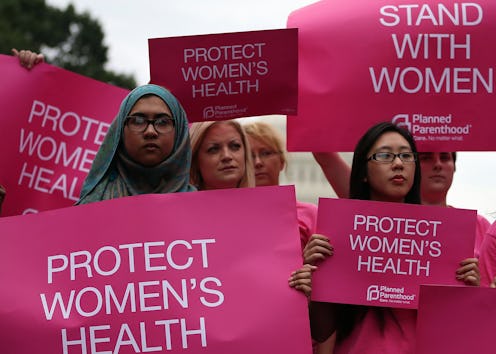News
My Post-Assault Treatment Is Why I Stand With PP

Trigger warning: This piece contains details about sexual assault.
In political discussions of Planned Parenthood, focus on its abortion services almost always overshadow the other crucial services it provides, including birth control consultations and STD testing. Anti-choice activists might conveniently forget about these essential aspects of its coverage, but I never will — in 2015, shortly after I was sexually assaulted, Planned Parenthood staffers handled my rape with warmth, grace, and kindness. That's why on the Pink Out Day in support of the organization, I choose to stand with PP not just because of its important work in providing abortion access, but because of their sensitivity toward me after my assault.
Like so many other stories of assaults I've read and heard from friends, mine started out as a consensual hookup. It was a red flag when he told me that he "never wears condoms," and that red flag became a siren when he begged me to go down on him until I finally gave in. When I told my friends the next day, they all commiserated — this guy was well-known for being "aggressive" and "forward," but nobody used the words rape or assault. I didn't even use those words myself until I moved to the same town he lived a year later and was forced to confront the trauma I incurred.
I certainly didn't consider it a sexual assault a few months after the fact, when I went to Planned Parenthood to get tested for sexually transmitted infections. Despite being frantically tested a week or two after my assault, I decided to go again a few months later — I just wanted to make sure, and thought that maybe a few weeks after my assault was too soon to test positive for anything. I was incredibly anxious despite testing negative the last time, and I tapped my foot nervously in that small, nondescript waiting room. I remember that waiting room better than I remember the assault. I'd just bought a copy of Brave New World and was reading it without taking it in. I realized a few days later that I'd left it there because I was so preoccupied.
Although I consider myself sex-positive and aim to combat the stigma against people with STDs, I've always felt kind of guilty getting tested. In hindsight, I think that guilt and nervousness must have motivated me to explain myself to the nurses taking my blood. Without realizing I was doing it, I spilled my whole story to them — that I'd had a few drinks, that I'd gone there with the intent to hook up, that he said he never wears condoms, and what he did to me.
It wasn't until the most recent spate of threats to defund Planned Parenthood that I truly realized its simple and essential role in my healing from that assault.
It felt good to get it all out, but what felt even better was the kind and understanding looks they gave me. No pamphlets, no patronizing sympathy, not even a "diagnosis" of sexual assault. They treated me like I was normal, like what I was doing there was normal, and despite not saying anything to suggest they shared my experience, they seemed to know what I'd been through.
In the years since my assault and subsequent STD testing at that local Planned Parenthood center, I've supported the organization while recognizing its role at the center of white feminism's single-issue focus on abortion and birth control access. In responding to so many other attacks on my various identities and the ills of white supremacy that result in the deaths of innocent Black and brown people, I've often forgotten about that assault entirely.
It wasn't until the most recent spate of threats to defund Planned Parenthood that I truly realized its simple and essential role in my healing from that assault. Planned Parenthood does so much more than provide abortions, and without it, I can't imagine what my post-assault life would have been like.